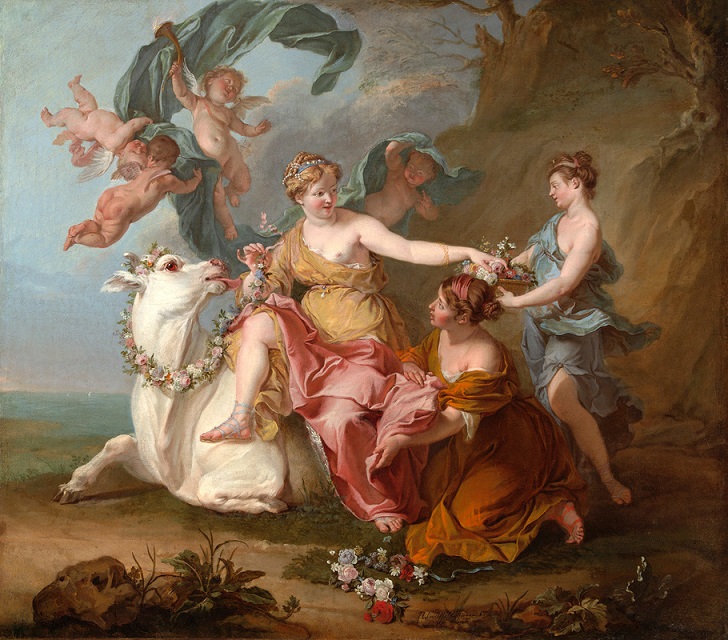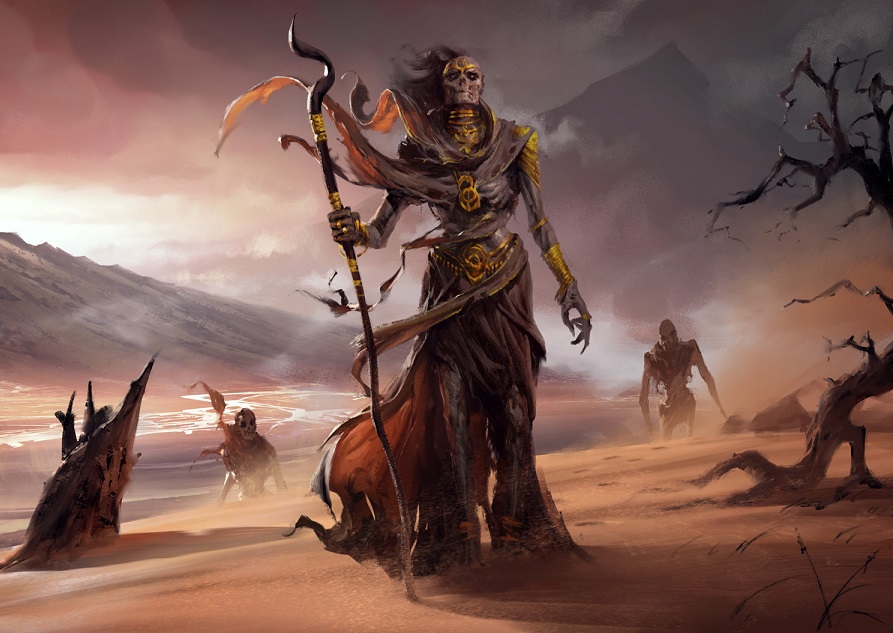Asterion or Asterius
Asterion (Ancient Greek: Ἀστερίων, literally "starry") was the name given to a legendary king of the island of Crete in Greek mythology. A descendant of Deucalion, Asterion would take the princess Europa as his wife.
KING ASTERION OF CRETE
Asterion was the son of Tectamus, born to a daughter of Cretheus; thus, Asterion was the great-great grandson of Deucalion, and great-grandson of Aeolus.
Tecatamus had become King of Crete when he arrived with colonists from Pelasgia and Aeolis, supplanting the rule of the sons of Tegeates, Archedius, Cydon, and Gortys, who had previously arrived from Arcadia.
Asterion would succeed his father as the king of Crete.
ASTERION AND EUROPA
It was at the time that Zeus abducted the princess Europa from Phoenicia, and took the beautiful Europa to Crete. Beneath a cypress tree, Zeus would couple with Europa, and from this relationship three sons, Minos, Sarpedon and Rhadamanthys were born.
Zeus left Europa behind upon Crete, but Asterion decided that Europa would make the perfect queen for Crete, and so Asterion wed Europa, and adopted her three sons as his own.
Marrying Europa brought added benefits, for the royal family of Crete now also possessed the gifts given to Europa by Zeus. The automaton Talos now defended the island of Crete from invaders, whilst the hunting dog Laelaps and the javelin that also hit its mark were now co-owned by Asterion.
SUCCESSOR TO ASTERION
Nothing more is said of Asterion until the question of succession arose with the king of Crete’s death, some tell of Rhadamanthys succeeding his stepfather, before being overthrown by Minos. More commonly though, it was said that Minos was made king after the gods showed the people of Crete that they favoured him, when a white bull was sent from the sea.
ASTERION - THE MINOTAUR
Asterion’s name would live on though, for when Pasiphae, the wife of King Minos, fell pregnant by the Cretan Bull, the half-man- half-bull child born to the queen of Crete was named Asterion for his grandfather, although of course that child would be better known as the Minotaur.
In Greek mythology, Asterion also refers to the following figures:
Asterion, one of the Potamoi.
Asterius, one of the Giants.
Asterion, an attendant of the starry-god Astraeus.
Asterion or Asterius, king of Crete.
Asterion or Asterius, name of the Minotaur.
Asterion, son of Zeus and Idaea, the real name of Minos.
Asterius, son of Minos and Androgenia, a girl from the Cretan city of Phaestus. He was the commander of Cretans who joined the god Dionysus in his Indian War. Asterius never returned to his homeland but instead settled among the Colchians and named them Asterians. There Asterius fathered Miletus, Caunus, and Byblis.
Asterius, a king of Anactoria (Miletus) and son of Anax, son of Gaia. He was slain by the hero Miletus who named after himself the newly conquered lands.
Asterius, according to Hyginus one of the Sons of Aegyptus, who married Cleo, daughter of Danaus.
Asterius, a prince of Pylos and son of King Neleus by Chloris, daughter of Amphion of Orchomenus. He was the brother to Pero, Asterius, Pylaon, Deimachus, Eurybius, Epilaus, Evagoras, Phrasius, Eurymenes, Alastor, Nestor and Periclymenus. Asterius was slain along with his brothers, except Nestor, by Heracles when the hero took revenge to Neleus who refused to cleanse him from blood-debt.
Asterion or Asterius, an Argonaut from Piresia in Thessaly.
Asterius or Asterion, an Argonaut from the Achaean city of Pellene. He was the son of Hyperasius, descendant of Pelles, son of King Phorbas of Argos. In two separate accounts, Asterius and his brother Amphion were called the children of Hypso while Hippasus was said to be their father.

Sources
Pseudo-Apollodorus, Bibliotheca III.1.2; Asterius "having died childless" III.1.3; scholiast on Iliad XII.292.
Pseudo-Apollodorus. Bibliotheca, Book 3.1.2–4
Diodorus Siculus, IV.60.3, give Asterius; Pausanias, Description of Greece II.31.1, gives Asterion
Nonnus. Dionysiaca, Book 1.354, 2.695
Kerenyi (1951), p. 111; Kerenyi (1976), p. 105.
Pseudo-Apollodorus. Bibliotheca, Book 3.1.4
"Greek Legends and Myths"













